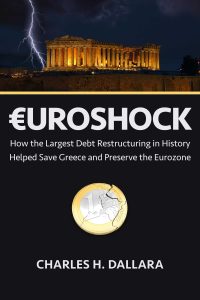“Euroshock”: the story of Greece’s debt restructuring told by one of its main actors
 The days when Greece teetered at the brink of default may seem now safely in the past. Still, the complicated task of arranging for a debt restructuring that would be compatible with the institutional framework of the Eurozone that would get the acceptance of the international financial circles and would furthermore help the Greek economy get through the cliff-hanger experience with the least possible breakage remains largely unsung.
The days when Greece teetered at the brink of default may seem now safely in the past. Still, the complicated task of arranging for a debt restructuring that would be compatible with the institutional framework of the Eurozone that would get the acceptance of the international financial circles and would furthermore help the Greek economy get through the cliff-hanger experience with the least possible breakage remains largely unsung.
“Euroshock” by Charles H. Dallara, who assumed a central role in this operation as managing director of the Institute of International Finance, gives the inside story of “How the Largest Debl Restructuring in History Helped Save Greece and Preserve the Eurozone”. Euroshock was presented to a Greek audience soon after its launch in the US: former Finance Minister Ghikas Hardouvelis (nowadays Chariman of the Greek Bank Federation), former Bank of Greece Governor and consequently ECB Vice-President Lucas Papademos and Constitutional Law Professor, back then Alternate Prime Minister Evangelos Venizelos shared recollections of the high-intensity negotiations Ch. Dallara documents in ‘Euroshock”. Major European figures of that time, such as German Chancellor Merkel, French President Sarkozi and the late Wolfgang Schaeuble who was at the helm of the Federal Finance Ministry participate to the cast of the play.
The opening remarks of Charles Dallara in “Euroshock” – which will be published in Greek by economia Publishing in fall 2024 – are quite a shock for the reader, as they describe the upheaval the Eurozone was going through at the time:
 “In 2010 and 2011 Europe was enveloped in a severe economic crisis. The global economy had begun to recover from the upheaval precipitated by the global financial crisis of 2008 and 2009, but now Europe threatened to pull the world back into another period of economic turbulence and misery.
“In 2010 and 2011 Europe was enveloped in a severe economic crisis. The global economy had begun to recover from the upheaval precipitated by the global financial crisis of 2008 and 2009, but now Europe threatened to pull the world back into another period of economic turbulence and misery.
Ireland, Italy, Spain, and Portugal were each caught up in their own web of volatility and job destruction, throwing their economies asunder. They were not, however, moving independently, but in a vortex that fed on the weakness of each country and magnified the risks to Europe as a whole through multiple channels of contagion. The entirety of the European economy came under a dark cloud as doubts grew about the ability of the Eurozone to hold together. A currency union had been created a mere decade before-the crown jewel in the more than half century-long effort to create a unified Europe-and profound questions were now being raised about the sustainability of the common currency in this tempest.
At the center of this upheaval was Greece. With an economy that was barely 12% the size of Italy’s GDP and only 20% of Spain’s, Greece had somehow taken center stage in this European calamity. The global markets had abruptly severed the flow of funds to Greece in late 2009, and the Greek economy was being kept afloat by the International Monetary Fund (IMF) and other Eurozone member countries as Greek leaders strove to stanch the bleeding. Efforts to stabilize Greece and bring calm to broader European waters were, however, flagging, as global markers were increasingly infected by the drama playing our in Greece and in other corners of Europe.
The frantic search for solutions began to circle around an exceedingly vexing question: would Greece’s debt to private creditors need to be reduced and restructured-as an essential complement to economic reform-in order to bring stability to Greece and ease the virulent spread of marker pessimism surrounding Europe?
There were two camps: those who thought that such a move was anathema to the basic concepts underlying Europe’s common currency and could lead to a domino effect of other Eurozone countries restructuring their own sovereign debt, thus undermining the euro; and those who felt that a restructuring was the only way to “lance the boil,” diminish the spread of contagion, and put Greece on a sustainable path to recovery.
It is no exaggeration to say that at that moment the future of the European economy hung in the balance, as did the potential risk of round two in the global financial crisis.”






